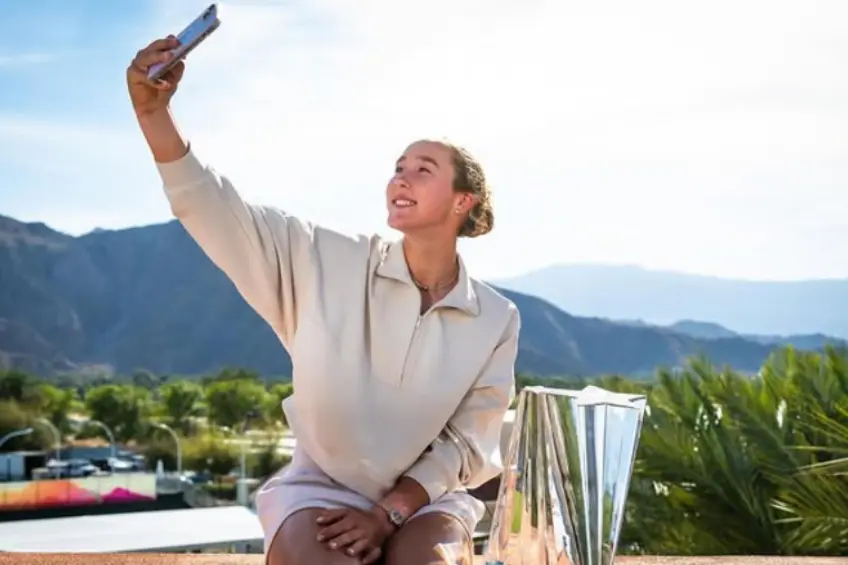
At just 17, Mirra Andreeva has become a force to be reckoned with in women’s tennis, her racquet carving a path through the sport’s elite with a maturity that belies her age. The Russian prodigy, now ranked world No. 6, recently opened up about the mental shift that propelled her to back-to-back WTA 1000 titles in Dubai and Indian Wells in 2025. Reflecting on her journey, Andreeva revealed that learning to shed the weight of on-court negativity has been the key to her meteoric rise, transforming setbacks into stepping stones and fueling a 12-match winning streak that stunned the tennis world.
Andreeva’s breakthrough came into sharp focus at Indian Wells, where she outlasted top seed Aryna Sabalenka in a gripping final, 2-6, 6-4, 6-3, to claim her second consecutive WTA 1000 crown. The victory was no fluke—she had already toppled world No. 2 Iga Swiatek in a thrilling semifinal, 7-6(1), 3-6, 6-3, showcasing her ability to compete with the best. “I found that balance to not really be depressed on court,” Andreeva shared after her triumph, her words capturing a newfound resilience. “When I’m losing or when I’m not playing my best, I try to stay positive, to keep fighting, and it’s made all the difference.” This mindset, she explained, allowed her to regroup after dropping the first set against Sabalenka, turning the match into a testament to her mental fortitude.
The road to this epiphany wasn’t always smooth. Andreeva’s early career was marked by moments of emotional turbulence—most notably at Wimbledon 2023, where, at 16, she tearfully exited after a controversial point penalty for tossing her racquet in a loss to Madison Keys. That fiery passion, while a hallmark of her intensity, sometimes hindered her focus. “I used to let mistakes eat at me,” she admitted, reflecting on her growth. Working with coach Conchita Martinez, a former Wimbledon champion, Andreeva began honing not just her versatile groundstrokes but also her ability to stay composed under pressure. Martinez’s guidance helped her channel that energy, turning frustration into determination. “We’ve worked so hard on keeping my head clear,” Andreeva said, crediting her coach for teaching her to “play smart, not just hard.”
Her 2025 season has been a masterclass in applying those lessons. In Dubai, Andreeva stormed through a gauntlet of Grand Slam champions—Marketa Vondrousova, Swiatek, and Elena Rybakina—before defeating Clara Tauson in the final, 7-6(1), 6-1. “At first, it was all adrenaline, and then I felt a little bit like I was in euphoria,” she recalled of her first WTA 1000 title. Her speech in Dubai went viral when she playfully thanked herself, saying, “I want to thank me for never quitting and always believing in myself.” That self-assurance carried her to Indian Wells, where she became the youngest player since Steffi Graf and Serena Williams to defeat the world’s top two in a single WTA event, a feat that cemented her as a future star.
Andreeva’s success extends beyond singles. At the 2024 Paris Olympics, she and Diana Shnaider claimed a silver medal in women’s doubles, and in Miami 2025, they won their first WTA 1000 doubles title together. Yet, it’s her mental evolution that has truly set her apart. “I try to run like a rabbit out there,” she laughed after Indian Wells, describing her effort to keep up with Sabalenka’s blistering pace. “Aryna’s sending bullets, but I just tell myself to keep moving, keep believing.” That tenacity shone through in her comeback victories, where she repeatedly clawed back from deficits, proving that her heart matches her talent.
Off the court, Andreeva’s charm remains infectious. She speaks three languages, is learning Spanish to banter with Martinez, and dreams of owning a dog—a reward her parents promised when she cracked the top 20 last year but have yet to deliver. “We’re still waiting for the dog,” she quipped, her humor a reminder of her youth. Yet, her ambitions are anything but small. Inspired by idols like Andy Murray, who once defended her mental strength on social media, Andreeva aspires to emulate the longevity of Novak Djokovic, who she’s watched obsessively since childhood. “I want to keep improving, to see how far I can go,” she said, her eyes already on the Rome Masters and beyond.
As Andreeva prepares for the clay season, her story is one of transformation—not just of a teenager into a champion, but of a player who learned to embrace joy over despair. Her victories over Swiatek, Sabalenka, and Rybakina—three of the sport’s biggest hitters—signal a shift in women’s tennis, where Andreeva’s cunning, all-court game could redefine the top tier. With a smile and a steely resolve, she’s not just chasing titles but rewriting her narrative, one positive point at a time.
Leave a Reply